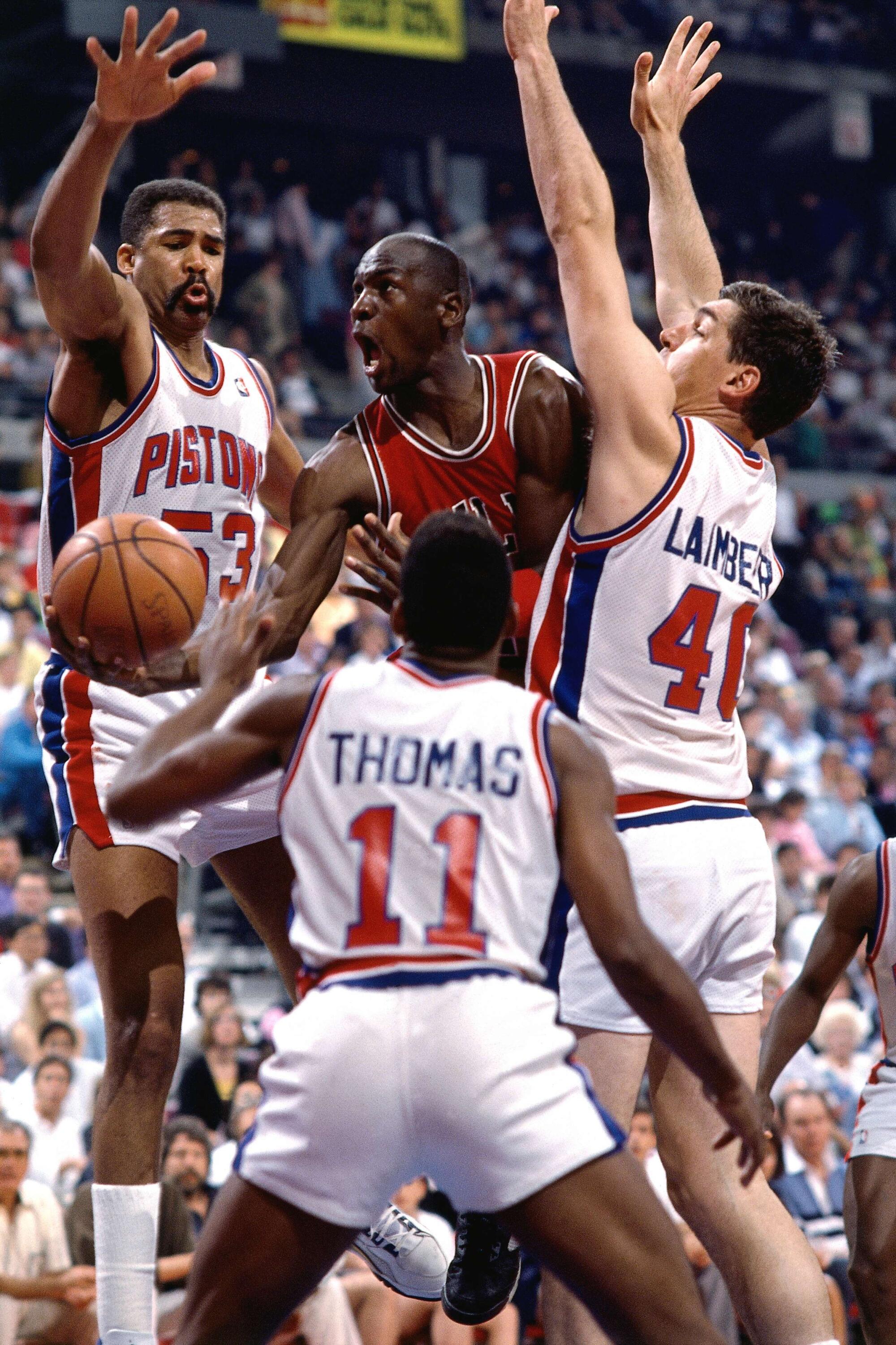
- Share via
Even compared to the overall growth spurt that’s come to TV with the rise of streaming, documentaries about sports are the gifts that keep on winning.
Over the decades, spurred by their popularity with viewers and frequent critical acclaim, TV networks churned out a steady stream of feature documentaries and docuseries exploring major milestones, historical events and leading figures such as Muhammad Ali and Babe Ruth, represented by titles such as HBO’s “When It Was a Game,” ESPN’s “30 for 30” series, Showtime’s “Kobe Bryant‘s Muse” and Oscar winner “O.J.: Made in America.”
But that was before “The Last Dance.”
Aided by pandemic shutdowns and the absence of live sports, the epic ESPN/Netflix co-production, centered on enigmatic superstar Michael Jordan and the Chicago Bulls dynasty of the 1990s, premiered in April 2020 and swiftly became a bona fide blockbuster. The 10-part series enticed millions of sports fans and non-sports fans alike with its mix of never-before-seen footage, over-the top personalities and thrilling action, all set against a backdrop of social change. And in the process, it created a ripple effect for sports stories on TV that’s still being felt.
The complete guide to home viewing
Get Screen Gab for everything about the TV shows and streaming movies everyone’s talking about.
You may occasionally receive promotional content from the Los Angeles Times.
“That really jolted the industry,” said former HBO Sports President Ross Greenburg. “It came along at the perfect time during the pandemic when people needed something to watch. I think it also triggered [to] the streamers and networks that this is a great form of storytelling.”
“The Last Dance” has been followed by an explosion of sports documentaries, particularly on streaming, embracing a kaleidoscopic range of platforms, personalities and subject matter: On top of perennial fly-on-the-wall glimpses of NFL training camp and the Stanley Cup finals have been projects about the personal and professional struggles of Tiger Woods and Naomi Osaka; blow-by-blow, season-long accounts of the Formula 1 championship and a struggling soccer club; and intimate portraits of Tom Brady, Bubba Wallace, Derek Jeter, Steph Curry, John McEnroe and numerous others that highlight not only their achievements, but also their lives off the field or court.
A torrent of projects has even centered on just one team. The Los Angeles Lakers played a key part in three docuseries and one scripted drama — Apple TV+’s “They Call Me Magic,” HBO’s “Shaq,” Hulu’s “Legacy: The True Story of the L.A. Lakers” and HBO’s “Winning Time: The Rise of the Lakers Dynasty” — in 2022 alone. The second season of “Winning Time” is due this year. (Yet another Laker, LeBron James, is the subject of “Shooting Stars,” a dramatization of the future Hall of Famer’s origin story that premiered earlier this month on Peacock.)

And with the streaming wars continuing to heat up and the ongoing writers’ strike creating pressure for unscripted content to fill the gap, the onslaught of sports documentaries shows no signs of subsiding.
Serena Williams, who has already been profiled in several documentaries, recently announced that she will be the subject of a new ESPN documentary. Netflix will premiere a documentary about soccer superstar David Beckham, who will also be part of an upcoming Prime Video docuseries about the Manchester United soccer team’s historic 1998-99 season, in which it won three of the sport’s biggest trophies in a 10-day span.
The boom in sports fare has begun to raise questions, though, among some figures prominent in the genre. Are there too many sports documentaries in the pipeline for a project like “The Last Dance” to break through — or for fans to be able to keep up?
“There absolutely is a danger of oversaturation,” said Showtime Sports President Stephen Espinoza. “At this point, it’s becoming harder and harder to distinguish yourself, to be fresh and original.”
Amid a writers’ strike largely about the power of platforms, we take a snapshot of the streaming pecking order, from Netflix to (formerly HBO) Max.
Greenburg, who now heads his own production company, which produced the recent Netflix documentary “Bill Russell: Legend,” said that while the genre is “too rich with too many great stories” to run out of material, documentaries need a “unique point of view, and not fall into the danger of telling the same story over and over.”
Award-winning documentarian Marina Zenovich, whose extensive resume includes 2020’s “Lance,” about controversial cyclist Lance Armstrong, added: “Is the field of sports documentaries oversaturated? Yes. But there is an audience for it.”
Zenovich said she is not surprised that the sports documentary genre has blossomed. Her first sports-related project was 2014’s “Fantastic Lies” for “30 for 30,” which reported on the case of three members of Duke University’s lacrosse team who were falsely accused of rape.

“When I was [at the ESPYs, ESPN’s sports awards], I realized, ‘Oh my God, there are so many good stories in sports,” she said in an interview last month. “They can be so compelling, and with all the content [needs] from streamers and others, it’s become a whole business.”
She added, “Audiences in this day and age want documentaries on true crime, celebrity and sports. They don’t want politics. They want to get lost and remember what their favorite athlete did or what their rivals did. They are craving for athletes to be open and real, to show their humanity and faults.”
And the more sports programming there is, the more fans have flocked to it. Series that follow pro or college teams through an entire season have sparked an appetite for more extensive examinations of athletes and their personalities.
Espinoza, of Showtime Sports, said “Fans now expect that kind of coverage.”

Another factor that has fueled interest in sports-themed fare, according to experts, is an increased commitment to exploring sports through the lens of social justice or other issues that reflect the state of the country. “The Last Dance” and “O.J.: Made in America,” which depicted how race, celebrity and the broader culture shaped the rise and fall of former football great O.J. Simpson, set a new standard that other projects have been determined to match.
“It’s about providing a different context,” Greenburg said. “Otherwise, it’s not worth doing.” The Bill Russell project, he maintained, explored issues about race “that are still very relevant today. It showed the fierce struggle for civil rights.”
Espinoza echoed that sentiment: “It’s not about telling sports stories for the sake of telling sports stories. It’s about seeing how we can illuminate the human condition, societal issues and cultural developments.”
How platforms like Netflix and Prime Video measure success can mean the difference between life and death for a show. But those metrics remain opaque.
He pointed to Showtime’s 2020 film “Bad Hombres,” about Tecolotes de los Dos Laredos, a professional minor league binational baseball team that played half of its home games in Texas during the 2019 baseball season. Said Espinoza: “It was a look at immigration through the eyes of baseball.”
Because of the crush of sports fare, he said Showtime has set out to distinguish its slate with “high-end, visually appealing, theatrical projects that are sophisticated and complex.”
For all the pressures of increased competition, though, Zenovich said the sports documentary trend is unlikely to slow anytime soon.
And, she added, “I want to make more of them.”
More to Read
The biggest entertainment stories
Get our big stories about Hollywood, film, television, music, arts, culture and more right in your inbox as soon as they publish.
You may occasionally receive promotional content from the Los Angeles Times.














